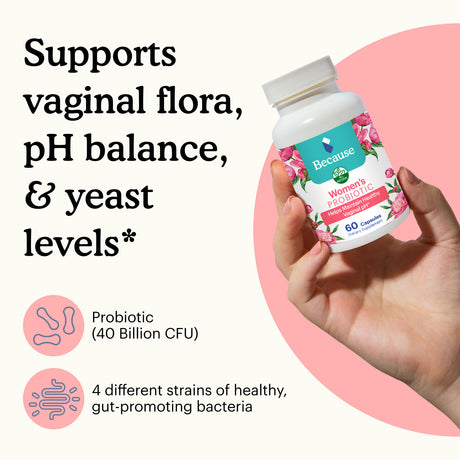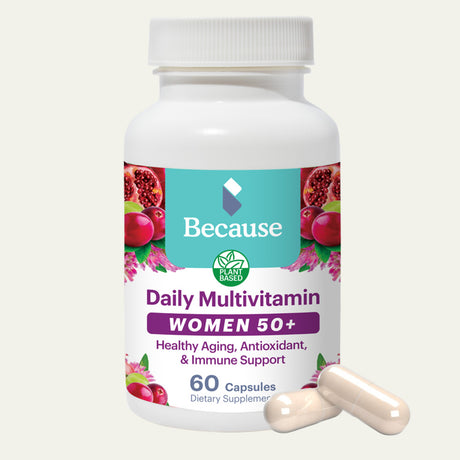Ensuring you get enough vitamins and minerals is crucial for maintaining overall health, but many people don't realize they may be falling short. In the US, poor diets are a mainstream phenomenon. About 75% of Americans don’t consume the recommended servings of fruit and more than 80% don’t consume enough vegetables. When it comes to deficiencies, almost all Americans have some. 94.3% of the US population doesn’t meet the requirement for vitamin D, 52.2% for magnesium, 44.1% for calcium, 43% for vitamin A, and 38.9% for vitamin C.
Recognizing the signs of these deficiencies can help you take proactive steps to improve your diet and well-being. Here are seven key indicators that you might need more vitamins and minerals in your diet.

1. Frequent Fatigue and Low Energy
Frequent fatigue and consistently low energy levels can often signal a nutritional deficiency, impacting your daily life and overall well-being. Studies indicate that lacking essential vitamins like B12 and iron can significantly affect your energy levels, leaving you feeling drained and sluggish.
Causes and Symptoms
The following vitamins and minerals can cause fatigue and low energy when you aren’t getting your daily allotment:
- Iron Deficiency: Leads to anemia, causing extreme tiredness and weakness.
- Vitamin B12 Deficiency: Essential for red blood cell production and neurological function, its lack can result in fatigue.
- Vitamin D Deficiency: Important for bone health and immune function, low levels are linked to tiredness.
- Magnesium Deficiency: Vital for energy production and muscle function, its deficiency can cause low energy and muscle fatigue. Low magnesium levels are associated with increased risk of cardiovascular disease, type 2 diabetes, and potentially osteoporosis.
- Folate (Vitamin B9) Deficiency: Necessary for DNA synthesis and repair, its lack can lead to fatigue.
- Vitamin C Deficiency: Important for iron absorption and immune function, low levels can contribute to feelings of fatigue.
- Potassium Deficiency: Crucial for muscle function and energy levels, its deficiency can result in weakness and fatigue.
Dietary Sources
To increase your nutritional intake of these vitamins and minerals, you’ll want to incorporate more of the following foods:
- Iron: Found in red meat, poultry, fish, lentils, beans, spinach, and fortified cereals.
- Vitamin B12: Abundant in meat, fish, dairy products, eggs, and fortified plant-based milks and cereals.
- Vitamin D: Present in fatty fish like salmon and mackerel, fortified dairy and plant-based milks, and exposure to sunlight.
- Magnesium: Available in nuts and seeds, whole grains, leafy green vegetables, and legumes.
- Folate (Vitamin B9): Found in leafy green vegetables, citrus fruits, beans, peas, and fortified cereals.
- Vitamin C: Rich in citrus fruits, strawberries, bell peppers, broccoli, and brussels sprouts.
- Potassium: Present in bananas, oranges, potatoes, sweet potatoes, spinach, and avocados.
Supplement Recommendations
The choice between individual supplements and multivitamins for addressing fatigue and low energy depends on your specific nutritional needs.
Multivitamins are a good option if you suspect multiple deficiencies or want a general boost, as they provide a broad spectrum of essential vitamins and minerals in one dose.
Individual supplements are better if you have a confirmed deficiency in a particular nutrient, such as iron, vitamin B12, or vitamin D. Targeting specific deficiencies can be more effective in addressing the root cause of fatigue and low energy.
It's always best to consult with a healthcare provider to determine the most appropriate supplement strategy for your needs.

2. Poor Memory and Cognitive Function
Poor memory and cognitive function can often be linked to a nutritional deficiency, affecting your ability to concentrate and recall information. Studies suggest that lacking essential nutrients like Omega-3 fatty acids, vitamin D, and B vitamins can significantly impair brain health and cognitive performance.
Brain Health and Nutrients
In order to ensure your brain stays happy and healthy, you should ensure your diet is rich in the following nutrients:
- Omega-3 Fatty Acids: Essential for brain structure and function, found in fatty fish, flaxseeds, and walnuts.
- Vitamin D: Supports cognitive health, available from sunlight, fatty fish, and fortified dairy products.
- Vitamin B12: Crucial for nerve health and brain function, found in meat, fish, dairy, and fortified cereals.
- Vitamin B6: Important for neurotransmitter synthesis, present in poultry, fish, potatoes, and bananas.
- Folate (Vitamin B9): Key for DNA synthesis and repair, found in leafy greens, legumes, and fortified cereals.
- Vitamin E: Acts as an antioxidant protecting brain cells, available in nuts, seeds, and green leafy vegetables.
- Magnesium: Vital for nerve transmission and neuromuscular conduction, found in nuts, seeds, whole grains, and leafy greens.
- Zinc: Supports brain signaling pathways, present in meat, shellfish, legumes, and seeds.
- Iron - Essential for oxygen transport to the brain, found in red meat, beans, and fortified cereals.
- Choline: Important for brain development and function, found in eggs, liver, and peanuts.
Boosting Brain Health
In addition to vitamins and minerals, there are several other nutritional considerations for maintaining and improving brain health:
- Antioxidants: Foods rich in antioxidants, such as berries, dark chocolate, and green tea, help protect brain cells from oxidative stress.
- Healthy Fats: Including sources of healthy fats, such as avocados, olive oil, and nuts, can support overall brain function.
- Hydration: Staying well-hydrated is essential for cognitive function, so ensure adequate water intake throughout the day.
- Whole Grains: Complex carbohydrates from whole grains like oats, quinoa, and brown rice provide a steady supply of glucose, the brain's primary energy source.
- Protein: Adequate protein intake from lean meats, legumes, and dairy supports neurotransmitter production and brain repair processes.
- Probiotics: A healthy gut microbiome, supported by probiotic-rich foods like yogurt, kefir, and fermented vegetables, is linked to better brain health through the gut-brain axis.
- Polyphenols: Found in foods like apples, onions, and red wine, polyphenols have been shown to support cognitive function and protect against neurodegenerative diseases.
- Balanced Diet: Overall, a balanced diet with a variety of nutrient-dense foods supports brain health and function, emphasizing the importance of diverse and well-rounded nutrition.

3. Frequent Urinary and Bladder Issues
Frequent urinary and bladder issues can often indicate a nutritional deficiency, impacting your overall urinary health. Research shows that lacking essential nutrients like vitamin C and D-mannose can lead to increased susceptibility to infections and other urinary problems. Additionally deficiencies in vitamin D can lead to increased risk of overactive bladder and urinary incontinence.
Urinary Health Indicators
Urinary health indicators, such as frequent infections, urgency, and discomfort, can signal underlying nutritional deficiencies. Studies have found that essential nutrients like vitamin C and probiotics play a crucial role in maintaining a healthy urinary tract. Addressing these deficiencies can help improve urinary health and prevent recurring issues.
Improving Urinary Health
Improving urinary health through nutrition involves incorporating foods rich in essential nutrients like vitamin C, which supports immune function and helps prevent infections. Probiotics found in yogurt, kefir, and fermented vegetables can also promote a healthy balance of bacteria in the urinary tract. Additionally, D-mannose, a natural sugar found in cranberries, can help reduce the frequency of urinary tract infections. Supplements containing these key nutrients can provide extra support for maintaining optimal urinary health.

4. Difficulty Sleeping
Difficulty sleeping can often be a sign of a nutritional deficiency, disrupting your overall well-being and daily functioning. Studies suggest that lacking essential nutrients like magnesium and vitamin B6 can significantly impact sleep quality and duration.
Sleep Support and Nutrition
Proper nutrition plays a vital role in supporting good sleep, as certain nutrients are essential for regulating sleep patterns. Magnesium and vitamin B6, found in foods like leafy greens, nuts, and bananas, help promote relaxation and improve sleep quality. Including these nutrients in your diet or through supplements can significantly enhance your ability to fall and stay asleep.
Enhancing Sleep Quality
In addition to proper nutrition, establishing a consistent sleep routine and creating a relaxing bedtime environment can greatly improve sleep quality. Reducing screen time before bed and practicing relaxation techniques, such as deep breathing or meditation, can also help you unwind and prepare for restful sleep. Prioritizing these habits can lead to more consistent and restorative sleep patterns.

5. Joint Pain and Stiffness
Joint pain and stiffness can often be signs of nutritional deficiency, impacting your mobility and overall comfort. Research indicates that lacking essential nutrients like vitamin D and Omega-3 fatty acids can contribute to inflammation and joint discomfort.
Joint Health Essentials
Essential nutrients for joint health include vitamin D, which helps maintain bone strength, and Omega-3 fatty acids, known for their anti-inflammatory properties. You can obtain vitamin D from sunlight, fatty fish, and fortified dairy products, while Omega-3s are abundant in fish like salmon, flaxseeds, and walnuts. For seniors, maintaining joint health is crucial to preserving mobility and independence, as joint issues can significantly impact the ability to perform daily activities. Ensuring an adequate intake of these nutrients can help reduce joint pain and stiffness, promoting a more active and comfortable lifestyle.
Maintaining Joint Health
Maintaining a healthy weight and engaging in regular low-impact exercises, such as swimming or walking, can significantly support joint health. Additionally, staying hydrated and avoiding prolonged periods of inactivity can help keep joints lubricated and reduce stiffness. If you struggle getting the required nutrients in your diet, try a supplement. Incorporating these habits into your daily routine can promote long-term joint health and mobility.

6. Weak Immune System
Getting sick frequently can be a sign that your immune system is weakened due to a nutritional deficiency. Essential nutrients like vitamin C and zinc are crucial for immune function, and lacking them can make you more vulnerable to infections.
Immune System Boosters
If you find yourself stocking up on Kleenex’s every month, try these immune boosters to kick your body back into shape.
- Vitamin C: Found in citrus fruits, strawberries, bell peppers, and broccoli.
- Vitamin D: Available from sunlight, fatty fish, fortified dairy products, and supplements.
- Zinc: Found in meat, shellfish, legumes, seeds, and nuts.
- Probiotics: Present in yogurt, kefir, sauerkraut, and other fermented foods.
- Elderberry: Can be consumed as a syrup, tea, or supplement.
- Garlic: Used in cooking or taken as a supplement for its immune-boosting properties.
- Echinacea: Commonly taken as a tea, tincture, or supplement.
- Ginger: Can be used fresh, dried, or as a supplement.
- Turmeric: Contains curcumin, which has anti-inflammatory and immune-boosting properties.
- Green Tea: Rich in antioxidants and beneficial for immune health.

7. Poor Skin, Hair, and Nail Health
Skin issues, hair loss, and weak nails can often signal a nutritional deficiency, affecting your appearance and overall health. Lacking essential nutrients like biotin, vitamin E, and omega-3 fatty acids can lead to these visible signs of poor nutrition.
Nutrient Deficiencies and Appearance
Nutritional deficiencies can significantly impact your appearance, often manifesting as skin issues, hair loss, and weak nails. For instance, a lack of biotin can lead to brittle nails and hair thinning, while insufficient vitamin E can result in dry, damaged skin. Omega-3 fatty acids are essential for maintaining skin elasticity and preventing inflammation, so their deficiency can cause dryness and irritations. Ensuring a balanced intake of these vital nutrients is crucial for maintaining healthy skin, hair, and nails, reflecting your overall well-being.
Working With Your Doctor to Fix Deficiencies
Working with your doctor to determine any nutrient deficiencies is crucial for addressing your specific health needs accurately and safely. Your doctor can perform tests to identify deficiencies and provide guidance on the right supplements to take, ensuring they effectively target your nutritional gaps.
Additionally, a healthcare professional can assess whether any supplements will interact with medications or treatments you are currently on, preventing potential adverse effects. This personalized approach not only optimizes your health and well-being but also ensures that your supplement regimen is safe and effective, tailored to your unique medical history and needs.
The Importance of Total Body Health
Balanced nutrition is fundamental for achieving and maintaining total body health. Ensuring you receive a wide array of essential vitamins and minerals supports everything from cognitive function and joint health to immune strength and overall energy levels. By focusing on a varied and nutrient-rich diet, you can prevent deficiencies that lead to common health issues such as fatigue, poor memory, and weakened immunity. Moreover, a balanced diet promotes not just physical well-being, but also mental and emotional health, contributing to a higher quality of life. Prioritizing proper nutrition is a proactive step towards sustained vitality and long-term wellness.
Sources:
Drake, V. (2017, Nov). Micronutrient inadequacies: Overview. Linus Pauling Institute, Oregon State University. Retrieved May 24, 2024, from https://lpi.oregonstate.edu/mic/micronutrient-inadequacies/overview
Higdon, J. (2001.). Magnesium: Cardiovascular disease prevention. Linus Pauling Institute. Oregon State University. Retrieved May 24, 2024, from https://lpi.oregonstate.edu/mic/minerals/magnesium#cardiovascular-disease-prevention
Higdon, J. (2001.). Magnesium: Osteoporosis prevention. Linus Pauling Institute. Oregon State University. Retrieved May 24, 2024, from https://lpi.oregonstate.edu/mic/minerals/magnesium#osteoporosis-prevention
The above links lead to a website provided by the Linus Pauling Institute at Oregon State University. Because Market is not affiliated or endorsed by the Linus Pauling Institute or Oregon State University
Jatoi, S., Hafeez, A., Riaz, S. U., Ali, A., Ghauri, M. I., & Zehra, M. (2020). Low Vitamin B12 Levels: An Underestimated Cause Of Minimal Cognitive Impairment And Dementia. Cureus, 12(2), e6976. https://doi.org/10.7759/cureus.6976
Przybelski, R. (2020, Nov. 19). Vitamin deficiency and its impact on brain health. Wisconsin Alzheimer's Disease Research Center. University of Wisconsin-Madison. Retrieved May 24, 2024, from https://www.adrc.wisc.edu/dementia-matters/vitamin-deficiency-and-its-impact-brain-health
Practical Neurology. (2023, January 20). Antioxidant flavonols are linked to slower memory decline. Retrieved May 24, 2024, from https://practicalneurology.com/news/antioxidant-flavonols-are-linked-to-slower-memory-decline
Kuphal, G. (2014). Urinary tract infections. Whole Health Library. U.S. Department of Veterans Affairs. Retrieved May 24, 2024, from https://www.va.gov/WHOLEHEALTHLIBRARY/tools/urinary-tract-infections.asp#ref-1
Cooper, T. E., Teng, C., Howell, M., Teixeira-Pinto, A., Jaure, A., & Wong, G. (2022). D-mannose for preventing and treating urinary tract infections. The Cochrane database of systematic reviews, 8(8), CD013608. https://doi.org/10.1002/14651858.CD013608.pub2
Qiang Zhang, Zhicheng Zhang, Xueyu He, Zhenmin Liu, Lianju Shen, Chunlan Long, Guanghui Wei, Xing Liu, Chunming Guo, Vitamin D levels and the risk of overactive bladder: a systematic review and meta-analysis, Nutrition Reviews, Volume 82, Issue 2, February 2024, Pages 166–175, https://doi.org/10.1093/nutrit/nuad049
Ji, X., Grandner, M. A., & Liu, J. (2017). The relationship between micronutrient status and sleep patterns: a systematic review. Public health nutrition, 20(4), 687–701. https://doi.org/10.1017/S1368980016002603
Arthritis Foundation. (n.d.). Vitamin and mineral guide for arthritis. Retrieved May 24, 2024, from https://www.arthritis.org/health-wellness/treatment/complementary-therapies/supplements-and-vitamins/vitamin-and-mineral-guide-for-arthritis














